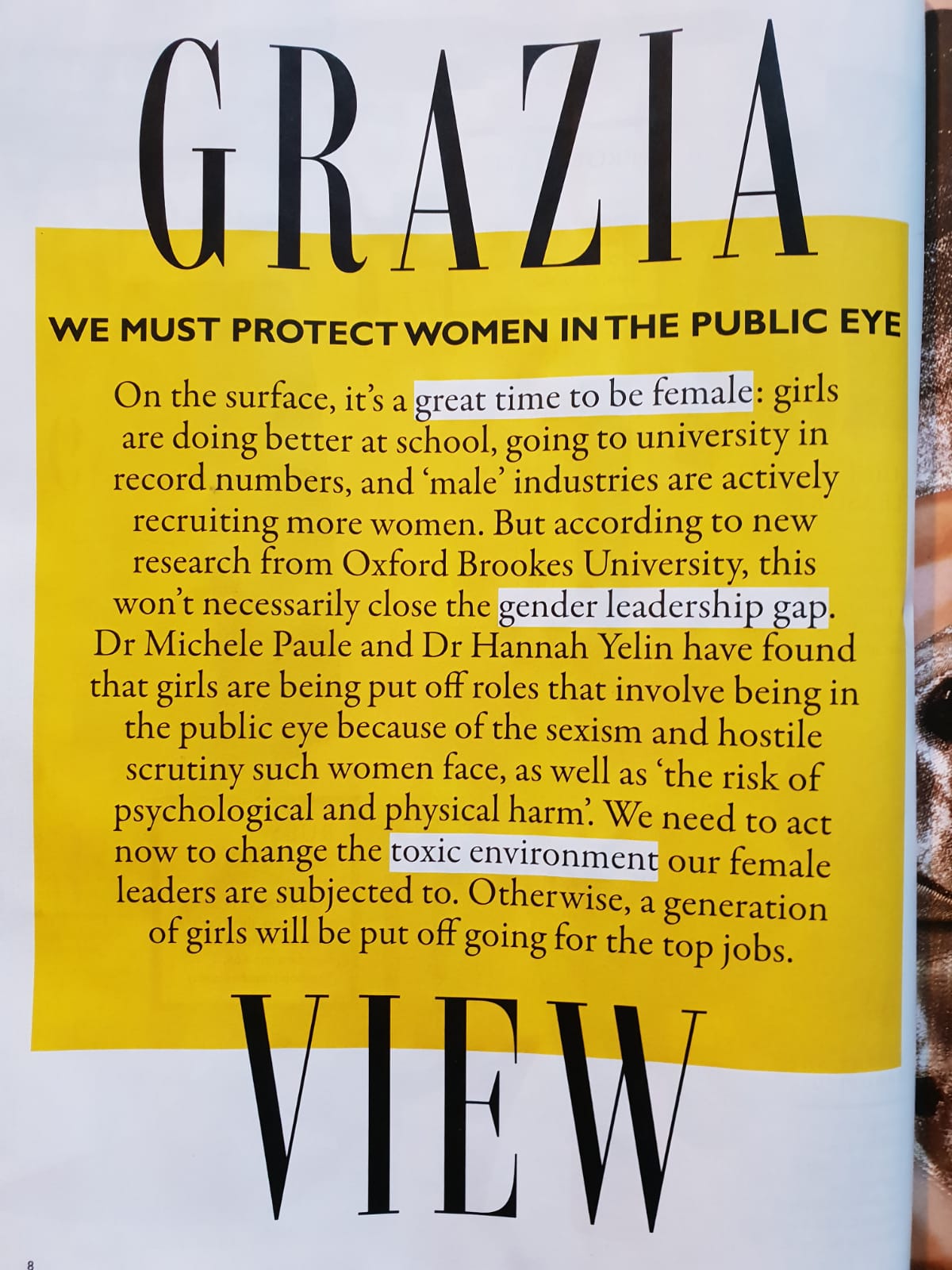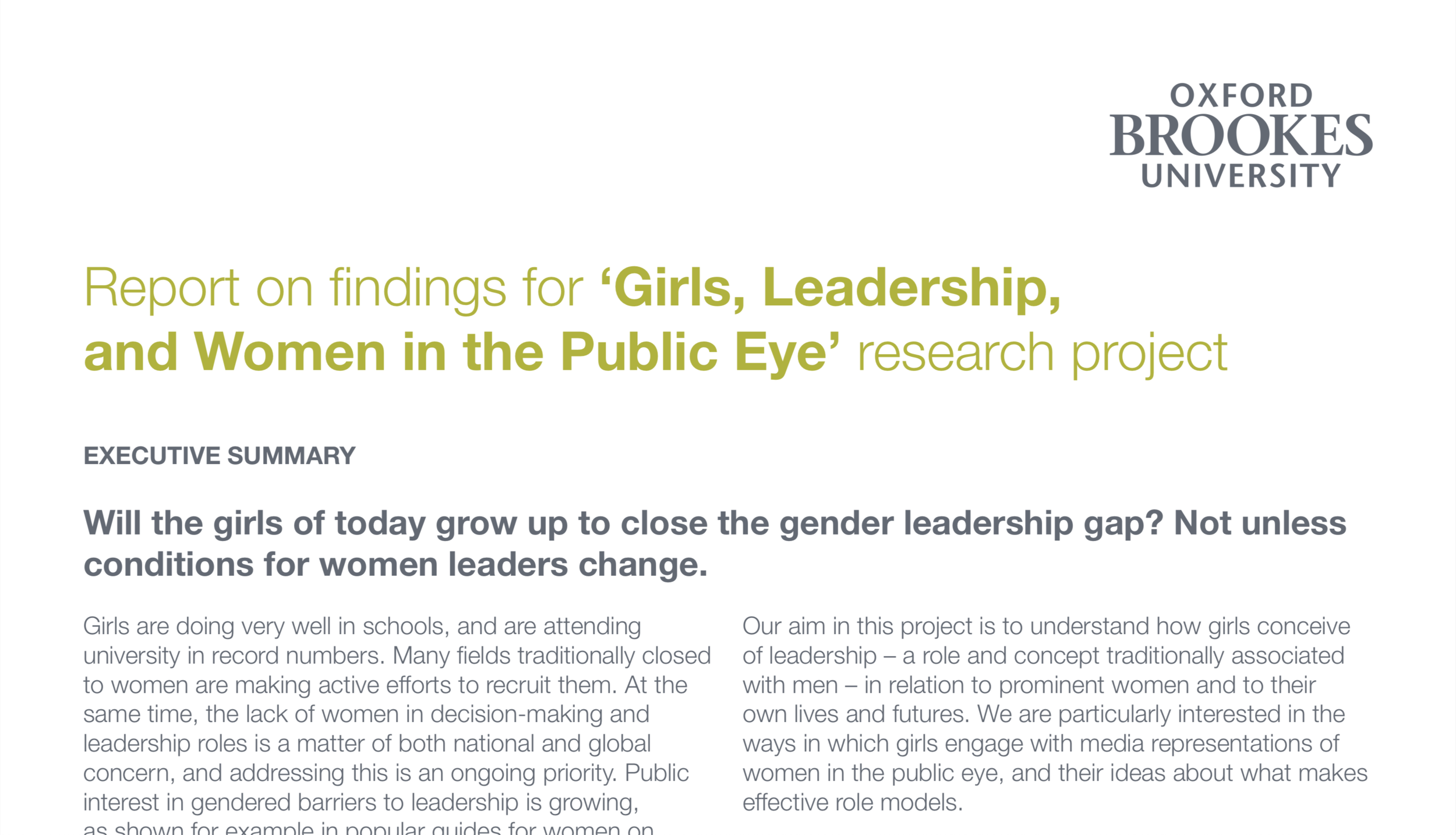GIRLS, LEADERSHIP AND WOMEN IN THE PUBLIC EYE
AFFILIATED RESEARCH PROJECT
Research Project: Girls, Leadership and Women in the Public Eye
Why would you want to? What girls think about becoming leaders of the future
The lack of women leaders across public and private sectors is a matter of national concern.
Findings from a pilot research study in secondary schools conducted by academics at Oxford Brookes University have found that girls lack opportunities to think about and practice leadership, and are simultaneously exposed to negative treatment of women leaders in the media.
During the study, girls aged 13-14 were interviewed in schools across the UK, and invited to contribute to collages and discussions of their favourite women leaders in closed social media groups.
Dr Michele Paule, Senior Lecturer in Media, Culture and Education at Oxford Brookes University said: “In the study, girls recognised that women leaders in the public eye are subjected to different kinds of criticism and abuse, and more of it altogether, than are men.
“While many of the girls expressed a desire to lead, to help make change and influence others, their ambitions were largely outweighed by what they saw as costs to women leaders.
The girls’ concerns particularly focussed on unrelenting media commentary on women’s appearances, and on online abuse of prominent women. Whether discussing politicians, actors or online celebrities, girls saw being in the public eye as at best, a mixed blessing for women.
Popular wisdom maintains that more women as role models in the public eye will help resolve gender imbalances in leadership. The girls’ responses to this though, suggest that the manner in which women are represented, rather than just the numbers, is important: if exposure is negative, the effect of seeing women in public leadership roles may be to put girls off.
Girls were aware of the contemporary idea that girls can do or be anything they want, but this wasn't always their experience. Taking charge, speaking up and appearing to seek attention were high on the list of behaviours that could not only make them unpopular, but could provoke hostility. BAME girls especially were aware of the risks for girls of becoming ‘too visible’, pointing to examples where Black women were targets of racism as well as sexism.
Dr Paule added: “The old cultural message they are still getting is that women should be quiet and look good, that the world does not want to hear from them or put them in charge. This is not encouraging girls to think that they might want to grow up to take a high-profile role in anything, including making the world a better place for themselves and others.”
Context here was key though. In some schools and classes girls felt much more comfortable speaking up than in others, for example, Religious Education was the most frequently mentioned subject where girls felt positive about expressing opinions and joining in debate. Out of school, while some girls described enjoying praise for civic initiatives, such as improving recycling in their town, others said that trying to initiate change within their communities would risk negative attention, even physical assault.
Dr Hannah Yelin, Lecturer in Media and Culture at Oxford Brookes University said: “One of the most troubling findings was the girls’ recognition that leaders tend to be drawn from the same small pool of wealthy people, and their feeling that this was unlikely to change.
“They saw leaders as mostly white, male and ‘Oxford’. Women leaders, especially women of colour such as Michelle Obama and Malala Yousafzai, were seen as rare exceptions who may be inspiring but whom in practice, it would be impossible for them to emulate without more encouragement and opportunities, and extraordinary courage.”
Patterns of privilege also played out within the girls’ own experiences. Many of the girls had no experience they recognised as developing their leadership. Those who said they had opportunities to participate in decision making at school level and in classroom settings were more likely to be high-achieving students.
Girls who took part in extracurricular activities, especially sports and music, were also more likely to claim experience and to express comfort with the idea of leadership. These girls also tended to be from more affluent backgrounds. Girls who attended youth clubs or were involved in youth movements such as Guiding talked enthusiastically about their opportunities, but such provision was patchy in its availability in the areas in the sample.
The pilot study was supported by funding from the Gender and Education Association and forms the first stage of an international study of girls’ experiences of leadership in local contexts and via media representations.
If you would like to arrange an interview or would like more information, please contact the Press Office at Oxford Brookes University: phone 01865 484452 or Email: pr@brookes.ac.uk
Executive Summary of Findings
The project was launched with an event Who Runs the World? Girls, Leadership and Celebrity at Senate House, London, bringing together those at the forefront of research into and work with girls, leadership and celebrity.
We launched the findings of our pilot study with an event Girls on Becoming the Leaders of the Future at Conway Hall in London.
This event presents findings from the ‘Girls, Leadership, and Women in the Public Eye’ project. It is aimed at those engaged in work with and for girls – in education, in youth work, in advocacy and activism, and in media commissioning/production - and may also be of interest to fellow scholars
It offers insights into girls’ understanding of leadership in relation to prominent women, to media representations, and to their own lives.
As well as the project findings, it features girls themselves in conversation with an exciting panel of women leaders.
Agenda
Girls from a London school interview a panel of women leaders drawn from politics, media, and activism about their experiences of leadership. Our panellists are:
· Shaista Aziz: Journalist (BBC, The Guardian, Al Jazeera), Labour councillor, stand-up comedian, and founder of the Intersectional Feminist Foreign Policy (IFFP) group
· Laura Coryton: Founder of Stop Taxing Periods and author of Speak Up, a book inspiring teenage girls to activism
· Isabel Adomakoh Young: Actor and campaigner for 50:50 Parliament
Jane Brady (Barrister and board member of The Jo Cox Foundation) interviews researchers Michele Paule and Hannah Yelin about the project.
Organisers
The project was launched with an event Who Runs the World? Girls, Leadership and Celebrity at Senate House, London, bringing together those at the forefront of research into and work with girls, leadership and celebrity. Speakers included Prof Anita Biressi, Dr Heather Mendick, Dr Grainne McMahon and Janet Batsleer, Dr Michele Paule and Dr Hannah Yelin.’







